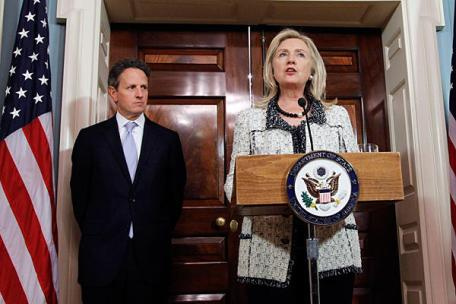Sanctions between Belligerent Parties Meaningless

IRD: On Tuesday, France and Britain announced that they have decided to impose a boycott on the Iranian Central Bank and on Iranian oil. This happened while Washington, the initial proposer of sanctions against Iran's Central Bank, kept the option out of its new package of punitive measures; preferring to focus on the first-time imposition of sanctions against Iran's petrochemical industry. We have discussed this issue in an interview with Amir-Hossein Tavakkoli:
IRD: Is this the first time a country’s central bank faces a boycott by other countries?
AT: Except for in cases such as war between countries (like the Second World War), severance of ties with another country’s central bank has never occurred. But we should clarify our definition of ‘boycotting’: when a state declares it is cutting off ties with the central bank of another country, liquidating the exchanges between them will become an issue, since central banks are the authority in liquidating debts. Since it will not be possible to sever ties with the banking system of a country, I believe the new punitive measure is meaningless. They could announce that they are going to stop cooperation with Iranian banks or withdraw from investment inside Iran; but carrying out such measures against the Central Bank means debts cannot be settled. So, instead of paying attention to the propaganda, we should see what is going to happen in practice.
IRD: During recent months, we had been witnessing Washington exert intense pressure on other countries to downgrade their financial ties with Tehran. How feasible is that considering the current global economic crisis? Are other countries ready to embrace the US’ proposals?
AT: In the world of today, economic relations are polyhedral in nature. I think such words are uttered by the West as part of their psychological warfare to scare our foreign business partners and upset the Iranian economy in order to rationalize their agenda before international public opinion or to decrease the pressure exerted on their country by the powerful lobbies. We have this global economy where Iran's oil, Singapore’s machines, Chinese components and Europe’s IT industry go hand in hand to manufacture a product whose target market is Africa or South America. If one piece of the jigsaw is lost, the whole picture will be incomplete. Could the other countries wait to see what comes next? I think that is impossible. Although despite a tight-knit global economy pressures could still be effective, they can’t move beyond a certain limit.
IRD: What are the alternative solutions for Iran?
AT: Let’s see what happens in practice. The content of these sanctions, and not their glossy title, is important. Until the boycott on our Central Bank is not realized, we should not fall into this web of conjectures. Indeed, we should see what alternative solutions the hostile countries have thought of, and what their consequences may be. Between belligerent parties, sanctions are meaningless, since neither side has adequately powerful levers to pressure the opposite party. For Iran, there are many alternatives available to counter the boycotts. Our business partners will not abandon us; they appreciate their interests more than some countries’ delusions.
* Amir-Hossein Tavakkoli is an economic affairs expert

